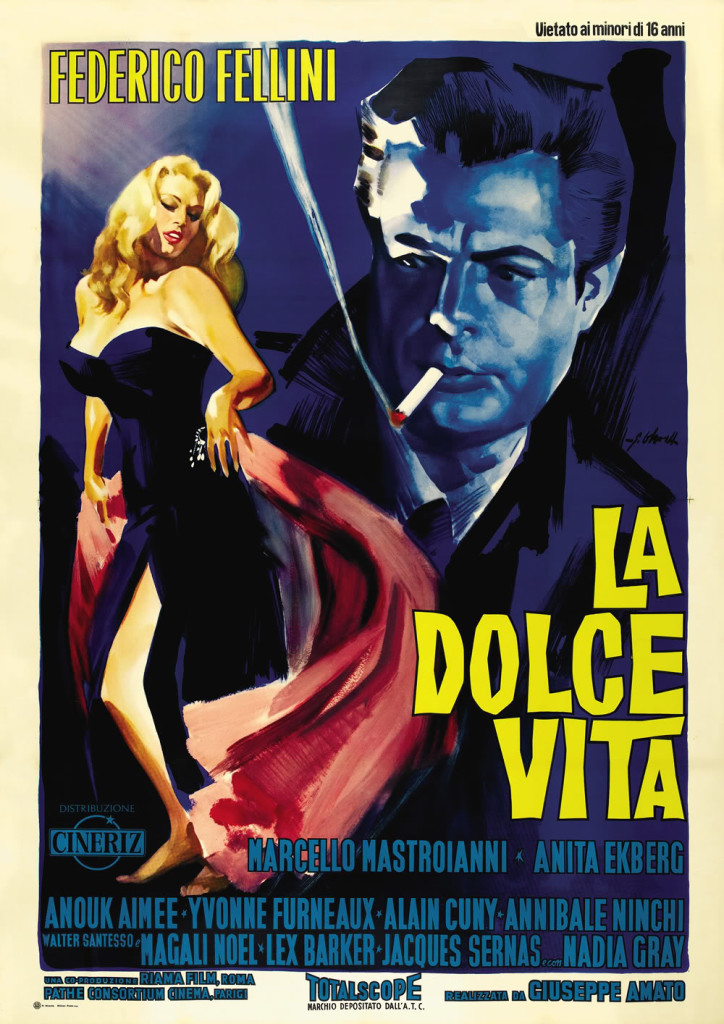A company assigned the same copyright in a film to two different companies. Who owns it?
The film is Italian classic La Dolce Vita:

The parties agree that a a company called Cinemat S.A. was the owner of the copyright, by assignment from original producer Riama Films S.p.A. The problem arises with the next link, with Cinemat subsequently conveying the copyright to two different companies, one in the plaintiff’s chain of title and one in the defendant’s chain of title. The court recites long chains of title for each party, but it all boiled down to which of the two original conveyances by Cinemat was the valid one.
The first conveyance in time (big file warning), on January 7, 1962, was from Cinemat to a company called Astor International. One hitch, though: Cinemat didn’t own the copyright at the time it signed the agreement with Astor International. Cinemat then obtained the copyright on March 9, 1962. After that there were two more conveyances — the first, on July 25, 1962, was a single-page assignment from Cinemat to a company called Astor Pictures. The second, on July 26, 1962, was between the same parties and explained that on January 11, 1962, four days after the Cinemat-to-Astor International agreement, Astor International had assigned its rights to Astor Pictures, and that this assignment from Cinemat directly to Astor Pictures was in furtherance of that agreement. These are the transactions through which plaintiff Paramount Pictures claims ownership.
Defendant International Media Film, Inc. (IMF) claims that it owns the copyright by virtue of an assignment on December 9, 1980 from Cinemat to a company called Hor A.G., 18 years after the Cinemat to Astor International/Pictures transactions.
It’s an easy conclusion, easy enough for summary judgment — Paramount, with the earlier assignment, owns the copyright. IMF tried to claim that the subsequent assignment to Hor called into question the validity of the earlier assignment to Astor International/Pictures. The court disagreed:
The purported Cinemat–Hor Transfer does not, in and of itself, call into question Plaintiffs’ ownership of the rights to the Film because it does not directly attack the authenticity or validity of any of the transfers in Plaintiffs’ chain of title. Rather, if Cinemat had already transferred the same rights to Astor Pictures in 1962, then the Cinemat–Hor Transfer eighteen years later is a nullity and therefore irrelevant to Plaintiffs’ Motion. Further, Defendant has cited to no case law, and the Court can find none, holding that evidence of a subsequent, conflicting transfer of rights calls into question an earlier transfer whose authenticity is established. Accordingly, the Court finds that evidence of the purported 1980 Cinemat–Hor Transfer is immaterial to the disposition of Plaintiffs’ Motion.
IMF also claims that the timing of the original assignment from Cinemat to to Astor International, before Cinemat actually owned the copyright, meant that the assignment was invalid. Examining the agreement, however, Cinemat assigned no more than it owned at the time:
The Cinemat–Astor International Agreement specifically provides that “[a]ll copyrights to the Film and registrations if and where existing thereof shall remain in the name of the Producers and/or the Seller” [i.e., Riama Films S.p.A.] until Astor International made all required payments under the contract. This language clearly contemplates that Riama may still retain some of the rights to the Film at the time the agreement was executed.
And, even if the first assignment to Astor International was invalid, the subsequent assignment from Cinemat to Astor Pictures directly, in which Cinemat stated that it “had no further rights of any kind in and to the Film” in the territory, did the trick:
Because Plaintiffs trace their chain of title through Astor Pictures, the Cinemat–Astor International Agreement is ultimately irrelevant, and thus Defendant’s arguments that it is internally inconsistent and that it purports to transfer rights that Cinemat did not own are likewise immaterial.
Thus Paramount Pictures owns the copyright and IMF was a contributory infringer by its licensing of the films.
Presumably the original assignments from Cinemat to Astor International/Pictures were not recorded, or else the court would have mentioned it. Presumably also, the assignment from Cinemat to Hor wasn’t recorded, or else IMF would have raised a bona fide purchaser in good faith defense. 17 U.S.C. § 205(d). Had either recorded, there wouldn’t have been a lawsuit.
Paramount Pictures Corp. v. International Media Films, Inc., No. CV 11-09112 SJO (AJWx) (C.D. Calif. June 12, 2013).

The text of this work is licensed under a Creative Commons Attribution-No Derivative Works 3.0 United States License.

Leave a Reply